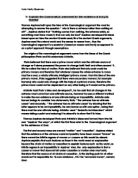Explain Freuds challenge to Kants moral argument for the existence of God
Thomas Hurley
Philosophy Homework
Questions
Explain Freud’s challenge to Kant’s moral argument for the existence of God (25 marks)
Kant believed that God's existence could only be established through faith, as opposed to logic. He reasoned that in a perfect world, behaving morally should lead to happiness, since happiness should be the natural reward for virtue. However this doesn't happen in our world so he reasoned that there must be something else that motivates people to behave morally, other than the possibility of immediate happiness. He argued people must be subject to an objective sense of obligation, which compels them to behave in a certain way, regardless of the consequences, this being the innate moral understanding. Kant said that our sense of duty was based on reason, whereas Freud argued that our conscience was a product of the unconscious mind or super ego of the human mind.
Kant would firstly suggest in his argument that we all have a sense of innate moral awareness, from this we are under obligation to be virtuous meaning we are obliged to be good and morally excellent, this first stage would suggest that our innate moral awareness has come from God. However, Freud easily undermines this first stage of Kant’s argument by stating that our moral awareness cannot originate from God because of the differing opinions to ethical issues, we would then not debate over ethical issues as we would all think the same. Kant said that an ‘average’ level of virtue is not enough, we are obliged to aim for the highest standard possible and that True virtue should be rewarded with happiness. However according to Freud, the Superego acts as the parent influence and a person will act through the values that their parents have given them. This suggests that if parents have given low moral values, then the person will have a different idea to what the highest level of virtue is compared to somebody with high values of moral understanding.





![Explain Kants Moral argument for the existence of God [Part A question]](https://mbt-essays-prod-public.s3.eu-west-1.amazonaws.com/1215651/listing/1215651_1.jpg)


